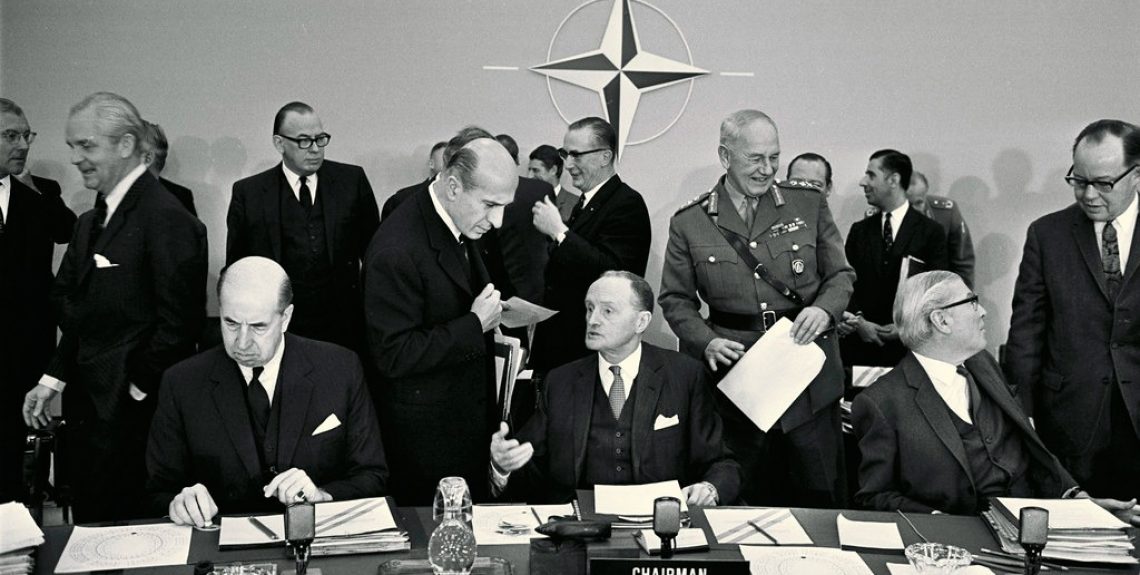This year marks the fortieth anniversary of the passing of Ambassador Manlio Brosio (Turin 1897-1980), the only Italian to hold the office of NATO Secretary General, from 1964 to 1971. After 1943, the government chose to appoint to some posting eminent persons that were not career ambassadors. Among them, Mr Brosio stood out for having remained in service for a long time, having fully acquired the diplomat’s attitude and having held the most prestigious positions: ambassador to Moscow (1947-1951), London (1951-1955), Washington (1955-1960) and Paris (1960-1964).
In Moscow he followed tenaciously the long negotiation for the release of the Italian prisoners of war, that ended with his mandate. During the 1947-48 period he took part to the internal debate on the prospect of Italy’s accession to a military alliance between the countries of Western Europe and the United States. In light of his subsequent role as NATO Secretary General, one might be surprised that Brosio expressed reservations, or at least invited to carefully evaluate this membership. He was not alone because also another future Secretary General, the Belgian Paul-Henri Spaak, at a certain moment he expressed some doubts. Ambassador Brosio was not moved by ideological reasons, a principled neutralism or pacifism, but by national interest; in a dispatch he did not hesitate to use the expression “sacred egoism” of Antonio Salandra in 1914. He wrote in a dispatch: “There are immediate interests of ours [the status of Trieste, the colonies, the admission to the UN, the revision of the peace treaty], that from this procrastination [i.e. of not formally being allies] would remain unprejudiced…”, “…while they would, by our hasty and thoughtless fretting about an uncertain and distant coalition, certainly be compromised”.
Besides keeping an eye on Soviet Union’s attitude vis-à-vis Italy, Ambassador Brosio drew attention above all on the strategic situation: “but this Atlantic Alliance that is going to be formed, would be able, in case of a war, to guarantee the integrity of our national territory?”. At that time, it was not an academic question and it worried the then Italian Chief of Defence Staff too. Missing this guarantee (the existing military plans envisaged a retreat at least behind the Apennines), “it would be in our interest to try to stay out, hoping that the Soviets will not want to waste time on a diversion towards a secondary front, south of the Alps”. A position that, in hindsight, perhaps does not appear farsighted, but that recalled the need to assert national interests in multilateral contexts and with the existing situational awareness.
In London, Brosio played a fundamental role in outlining the solution to the Trieste problem, stuck in an impasse that progressively wore out Italy’s position compared to that of Tito’s Yugoslavia, courted by Westerners after the break with Moscow. At that time Trieste and the Istrian Peninsula were divided into two zones, the allied-controlled A and Yugoslav-controlled B Zone. While the Ambassador to Washington, Alberto Tarchiani, also a political appointee, wrongly hoped in a strong American pressure on Tito, Brosio suggested another way: it was necessary to rebalance the situation by transferring the administration of Zone A from the Anglo-American control to the Italian administration, precisely because Yugoslavia controlled directly the Zone B.
The “Brosio plan”, as the British called it, after dramatic political-diplomatic events and some bloody disorders, was the basis of the October 1954 solution (London Memorandum). In September 1953, when Foreign Minister Attilio Piccioni resigned, due to the Montesi scandal (the death of a young girl, manipulated to become a political affair), President Luigi Einaudi offered the position to Ambassador Brosio. Showing institutional awareness and sense for measure and concrete politics, he declined the offer, mentioning as a matter of fact that he lacked of a strong political support.
As NATO Secretary General, Brosio tackled France’s exit from the integrated military structure. Drawing on his experience and credit gained in Washington, London and Paris, he managed this crisis flawlessly, in method and in substance, also because he had not an anti-Gaullist bias. According to the testimony of the American Stanton H. Burnett (when he was Counsellor for Public Affairs at the US Mission to NATO), Ambassador Brosio led the meetings of the Atlantic Council as “a fine jeweler carving out a stone”.
A reflection of him dated March 1954, which could appear in a diplomacy handbook, somehow sums up Brosio’s sense of great national dignity, his avoidance of diplomatic petty tricks: “We must neither always try to overcome our internal troubles with international diversions; nor instead put aside urgent international problems, while we fix our internal problems”.
Another reflection, might appear provocative to the serfs of multiculturalism and politically correct: “A higher civilization must also resist by force and impose itself by force. Historical fatalism that considers the justice of new movements to be inevitable only because they are new is the coward’s philosophy. Our civilization is superior. So we have two duties: to spread it and defend it ”. In my view it is the right statement of an identity pride that the West should really recover.
Finally, nothing has changed compared to what Brosio wrote in 1969: “The Atlantic Alliance is the largest alliance of democratic countries of modern times”. Perhaps his merits as NATO Secretary General have been acknowledged more abroad than in Italy itself: nemo propheta in patria.
Massimo de Leonardis
Professor of IR History at the Catholic University of Milan


























